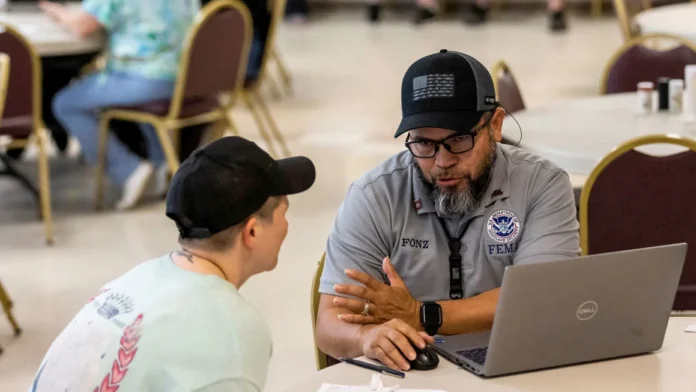Disasters such as the two major hurricanes, Helene and Milton, which recently struck the Southeastern United States.
To obtain money, individuals must submit an application to the US Federal Emergency Management Agency.
As of Friday morning, only FEMA assistance to Hurricane Helene victims was available. People affected by Hurricane Milton should wait to apply until the official federal disaster declaration is issued, which is likely later Friday.
Here is what folks should know:
How to Apply for FEMA Aid
There are three different ways to apply for FEMA aid.
Toll-free: 800-621-FEMA (3362). Calls are accepted every day from 7 a.m. to 11 p.m. throughout time zones, and assistance is provided in a variety of languages.
Register online at DisasterAssistance.gov or by using utilizing the FEMA App. People with Wi-Fi and powered-up technological gadgets may find that applying online is the quickest option.
Visit a Disaster Recovery Center in person. A list of open locations is available at fema.gov/drc.Floridians affected by both hurricanes will be forced to submit two applications, one for each event, FEMA Administrator Deanne Criswell announced Thursday.
Who is eligible for aid?
People must live in a declared disaster zone to be eligible for assistance. FEMA requires that they or someone living in their residence be a US citizen, noncitizen national, or qualified noncitizen.
Applicants will be requested to provide their Social Security number so that FEMA can verify their identification.
For several types of aid, FEMA will also verify that the disaster-damaged home is the applicant’s primary residence. The agency may send an inspector to examine the damage.
In general, FEMA help will pay non-insurance-covered home repair expenses.
What resources are available?
FEMA and the Small Business Administration are two federal agencies that oversee a number of disaster aid programs.
First, qualifying disaster victims will get a direct payment of $750 from FEMA to help them purchase any supplies they may require immediately following the storm, such as food, water, infant formula, medicine, and clothing. Recipients are not compelled to repay this money. This is FEMA's initial payout to catastrophe survivors, many of whom may be eligible for additional aid.
People who have been displaced from their homes as a result of the disaster can receive aid with home repairs, as well as rental assistance and lodging price reimbursement. The maximum amount of money available for these needs is $43,600, as determined by Congress.
FEMA offers funds for replacing or repairing personal property such as appliances, furniture, automobiles, and computers. The government will also provide funds to cover child care fees or increases in child care expenses caused by the disaster, as well as medical bills for disaster-related injuries or illnesses. These refunds, along with the original $750 payment, are capped at $43,600.
The SBA provides low-interest loans to renters, homeowners, company owners, and non-profit organizations who have suffered disaster-related losses.How to Find Local Assistance
Disaster victims may also be eligible for assistance from state and local organizations and nonprofits such as the American Red Cross, which helped 83,000 evacuees in Florida shelters Wednesday night and intends to provide food and relief materials to affected neighborhoods when they reopen.
The state of Florida has its own official Florida Disaster Fund, which distributes donations to service organizations around the state to help affected communities.
The federal website DisasterAssistance.gov also lists local resources.
IRS aid is also accessible.
The Internal Revenue Service is also assisting persons residing in FEMA-designated disaster zones.
Taxpayers affected by Hurricane Helene in Alabama, Georgia, North Carolina, and South Carolina, as well as sections of Florida, Tennessee, and Virginia, have until May 1 to submit and pay their individual and company tax returns. This includes tax returns for 2024, which are normally due in mid-April, as well as quarterly payroll and excise tax reports and projected income tax payments.
Additionally, those whose property was destroyed or damaged in a federally declared catastrophe may be eligible to claim a casualty loss deduction and receive a greater refund.
For more information, taxpayers should call the IRS catastrophe hotline at 866-562-5227.
